Algarve portugal – Nestled along Portugal’s southern coast, the Algarve beckons travelers with its breathtaking landscapes, rich history, and vibrant culture. From pristine beaches to rugged cliffs, from ancient Moorish castles to modern art galleries, the Algarve offers a captivating blend of natural wonders and cultural treasures.
As we delve into the heart of this enchanting region, we will explore its diverse ecosystems, uncover its fascinating past, and immerse ourselves in its vibrant present. Whether you seek sun-soaked relaxation, cultural exploration, or outdoor adventure, the Algarve promises an unforgettable experience.
Overview of the Algarve
The Algarve is the southernmost region of Portugal, renowned for its stunning coastline, pristine beaches, and rich history. It is situated in the south-central part of the country, bordered by the Atlantic Ocean to the south and the Spanish province of Huelva to the east.
The Algarve has a long and fascinating history, dating back to the Roman era. It has been ruled by various civilizations, including the Moors, who left a lasting legacy in the region’s architecture and culture. The Algarve became an independent kingdom in the 13th century and was later incorporated into the Kingdom of Portugal in the 15th century.
Key Statistics
The Algarve is one of the most popular tourist destinations in Portugal, attracting millions of visitors each year. It has a population of around 450,000 and covers an area of 4,960 square kilometers. The region’s economy is primarily based on tourism, agriculture, and fishing.
Algarve Portugal is a great place to visit for its stunning beaches, beautiful scenery, and delicious food. If you’re looking for a fun day trip from Algarve, consider visiting the adelaide zoo. The zoo is home to over 2,500 animals from around the world, including lions, tigers, elephants, and gorillas.
You can also see a variety of birds, reptiles, and fish. After a day at the zoo, you can relax on one of Algarve’s many beaches or enjoy a meal at a local restaurant.
Natural Beauty
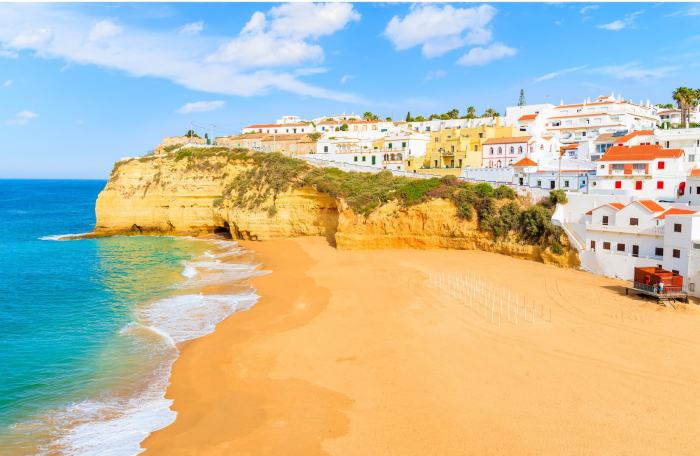
The Algarve is blessed with a stunning natural beauty that draws visitors from all over the world. The region boasts a diverse landscape, including pristine beaches, towering cliffs, and rolling mountains. The coastline is dotted with picturesque coves and hidden bays, while the interior is home to a variety of natural habitats, including forests, wetlands, and scrubland.
The Algarve is also home to a rich variety of flora and fauna. The region is home to over 2,000 plant species, many of which are endemic to the area. These include the Algarve daisy, the Portuguese broom, and the St. Vincent’s firefly. The Algarve is also home to a variety of animal species, including the Iberian lynx, the Bonelli’s eagle, and the common dolphin.
The Algarve’s natural beauty is protected by a number of conservation areas, including the Ria Formosa Natural Park, the Serra de Monchique Natural Park, and the Southwest Alentejo and Vicentine Coast Natural Park. These parks help to preserve the region’s unique flora and fauna and provide opportunities for visitors to enjoy the Algarve’s natural beauty.
Beaches
The Algarve is renowned for its stunning beaches. The region’s beaches are characterized by their white sands, clear waters, and gentle waves. Some of the most popular beaches in the Algarve include Praia da Marinha, Praia de Benagil, and Praia da Falésia.
Cliffs
The Algarve’s coastline is dotted with towering cliffs. These cliffs offer breathtaking views of the Atlantic Ocean and are a popular destination for hikers and climbers. Some of the most popular cliffs in the Algarve include the Ponta da Piedade, the Cabo de São Vicente, and the Seven Hanging Valleys.
Mountains
The Algarve’s interior is home to a number of rolling mountains. These mountains offer a variety of hiking and biking trails and are a great place to escape the hustle and bustle of the coast. Some of the most popular mountains in the Algarve include the Serra de Monchique, the Serra do Caldeirão, and the Serra da Arrábida.
Tourism
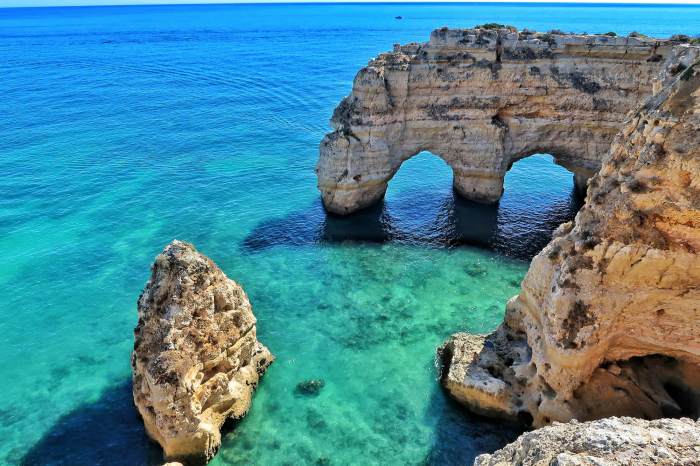
Tourism is the cornerstone of the Algarve’s economy, contributing significantly to its GDP and employment. The region’s stunning beaches, picturesque coastline, and mild climate attract millions of tourists annually.
Types of Tourism Activities
The Algarve offers a diverse range of tourism activities catering to various preferences:
- Beach Vacations: The Algarve boasts some of the most pristine beaches in Europe, perfect for sunbathing, swimming, and water sports.
- Golf: The region is renowned for its world-class golf courses, attracting golfers from around the globe.
- Cultural Experiences: The Algarve is steeped in history and culture, with numerous historical sites, museums, and art galleries to explore.
Infrastructure and Amenities
To support the thriving tourism industry, the Algarve has a well-developed infrastructure, including:
- Hotels and Resorts: The region offers a wide range of accommodation options, from budget-friendly hostels to luxurious resorts.
- Restaurants and Nightlife: The Algarve’s culinary scene is diverse, with countless restaurants serving fresh seafood, traditional Portuguese cuisine, and international fare. The region also boasts a vibrant nightlife with bars and clubs.
- Transportation: The Algarve is easily accessible by air, land, and sea. Faro Airport provides direct flights to major cities across Europe. The region has an efficient public transportation system, including buses and trains, making it easy to explore the area.
Culture and Heritage
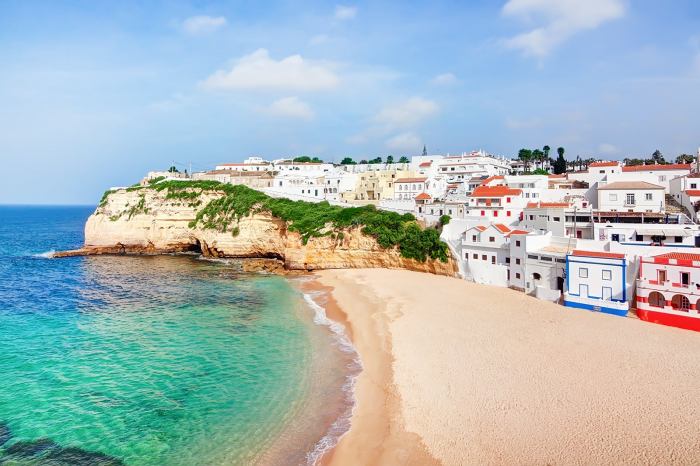
The Algarve boasts a rich cultural heritage shaped by centuries of Moorish, Portuguese, and other cultural influences. From traditional festivals to delectable cuisine, the region offers a unique blend of history and modernity.
Historical Landmarks and Architectural Styles, Algarve portugal
The Algarve is dotted with historical landmarks that showcase its diverse past. Moorish castles, such as the Castle of Silves, stand as reminders of the region’s Islamic heritage. Gothic churches, like the Sé Cathedral in Faro, display the architectural influence of the Portuguese Reconquista. The region’s whitewashed houses and cobblestone streets reflect the traditional Portuguese style.
Traditional Festivals and Music
The Algarve is renowned for its vibrant festivals, which celebrate local traditions and folklore. The Festival of São Lourenço, held in August, features colorful parades, traditional music, and fireworks. Fado, a melancholic Portuguese music genre, is popular in the region, with many restaurants offering live performances.
Cuisine
The Algarve’s cuisine is a culinary delight, showcasing fresh seafood, local produce, and traditional flavors. Cataplana, a seafood stew cooked in a copper pan, is a regional specialty. Grilled sardines and octopus are also popular dishes. Local wines, such as the DOC Algarve, complement the region’s gastronomy.
Gastronomy
The Algarve’s culinary traditions are a delightful blend of fresh seafood, local produce, and time-honored recipes. The region’s proximity to the Atlantic Ocean has shaped its cuisine, with an abundance of fish and shellfish featuring prominently in many dishes.
Typical Algarvean dishes include cataplana, a seafood stew cooked in a copper pot, and arroz de marisco, a flavorful rice dish with seafood. Local produce, such as tomatoes, peppers, and onions, are also widely used in Algarvean cuisine, adding vibrant colors and flavors to dishes.
The Algarve region of Portugal is a haven for luxury travelers seeking a blissful escape. Whether it’s indulging in world-class golf courses or pampering oneself at lavish spas, the Algarve offers an array of experiences that cater to discerning tastes.
To enhance your stay, consider incorporating some of the luxury travel tips available online, such as booking private tours, reserving exclusive dining experiences, and chartering a yacht to explore the stunning coastline. The Algarve awaits to provide you with an unforgettable and opulent vacation.
Restaurants and Food Markets
To experience authentic Algarvean cuisine, visitors can explore the region’s many restaurants and food markets. Local markets, such as the Mercado da Graça in Tavira, offer a wide variety of fresh seafood, produce, and local delicacies. For a more formal dining experience, there are numerous restaurants serving traditional Algarvean dishes alongside contemporary interpretations.
Accommodation
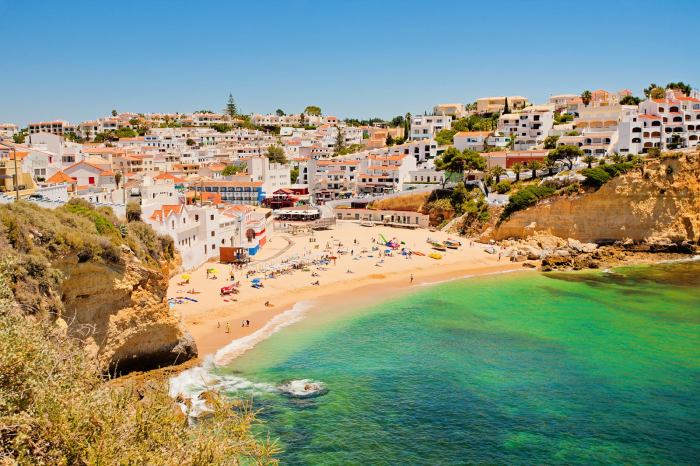
The Algarve offers a wide range of accommodation options to suit all budgets and preferences. From luxury resorts to budget-friendly guesthouses, there’s something for everyone in this vibrant region.
Luxury resorts can be found in abundance along the coast, particularly in the popular tourist destinations of Albufeira, Vilamoura, and Praia da Rocha. These resorts offer a range of amenities, including swimming pools, spas, fitness centers, and fine dining restaurants.
Mid-Range Hotels
Mid-range hotels are a great option for those who want to be close to the beach but don’t want to pay the high prices of a luxury resort. These hotels typically offer comfortable rooms, swimming pools, and restaurants.
Budget-Friendly Guesthouses
Budget-friendly guesthouses are a great option for budget travelers. These guesthouses typically offer basic rooms with shared bathrooms, but they are often located in convenient locations near the beach or other attractions.
When choosing accommodation in the Algarve, it’s important to consider your budget, location, and desired amenities. If you’re looking for a luxurious experience, a luxury resort is a great option. If you’re on a budget, a budget-friendly guesthouse is a great choice. And if you’re looking for something in between, a mid-range hotel is a great option.
Activities and Attractions: Algarve Portugal
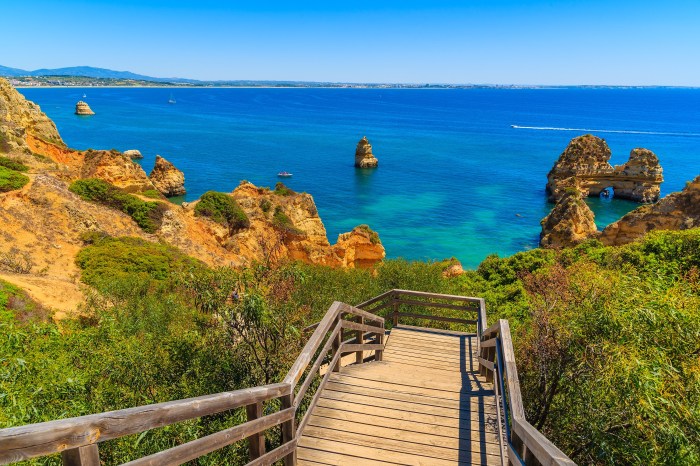
The Algarve offers a wide range of activities and attractions for visitors of all ages and interests. From water sports and hiking to biking and sightseeing, there is something for everyone to enjoy.
Many of the Algarve’s beaches are ideal for water sports such as swimming, surfing, windsurfing, and kitesurfing. The calm waters of the Ria Formosa lagoon are perfect for kayaking, canoeing, and paddleboarding. There are also several boat tours that offer the opportunity to see the Algarve’s coastline from a different perspective.
The Algarve’s varied landscape also makes it a great place for hiking and biking. There are numerous trails that wind through the region’s mountains, forests, and coastline, offering stunning views and plenty of opportunities for exercise.
Algarve, Portugal, is a beautiful region with stunning beaches, charming towns, and delicious cuisine. If you’re planning a trip to the Algarve, consider using your American Express Gold Card to take advantage of exclusive benefits, such as complimentary room upgrades, dining credits, and access to airport lounges.
American Express Gold Card benefits can help you make the most of your Algarve experience, from enjoying a luxurious stay at a five-star hotel to savoring a memorable meal at a Michelin-starred restaurant.
In addition to its natural beauty, the Algarve is also home to a number of historical and cultural attractions. The region’s capital, Faro, is home to a number of museums and churches, including the Faro Cathedral and the Museu Municipal de Faro. Other popular attractions include the Roman ruins of Milreu, the Moorish castle of Silves, and the Sagres Fortress.
Water Sports
- Swimming: The Algarve’s beaches are known for their calm waters and soft sand, making them ideal for swimming.
- Surfing: The Algarve has a number of surf spots that are suitable for surfers of all levels.
- Windsurfing: The Algarve’s strong winds make it a popular destination for windsurfers.
- Kitesurfing: Kitesurfing is a relatively new sport that is gaining popularity in the Algarve.
- Kayaking: The Ria Formosa lagoon is a great place to kayak, with its calm waters and abundant wildlife.
- Canoeing: Canoeing is another popular way to explore the Ria Formosa lagoon.
- Paddleboarding: Paddleboarding is a great way to get a workout while enjoying the Algarve’s beautiful scenery.
Hiking and Biking
- Hiking: The Algarve has a number of hiking trails that wind through the region’s mountains, forests, and coastline, offering stunning views and plenty of opportunities for exercise.
- Biking: The Algarve’s varied landscape also makes it a great place for biking. There are numerous bike paths and trails that wind through the region’s mountains, forests, and coastline.
Sightseeing
- Faro: The Algarve’s capital, Faro, is home to a number of museums and churches, including the Faro Cathedral and the Museu Municipal de Faro.
- Roman ruins of Milreu: The Roman ruins of Milreu are located in the town of Estoi, just outside of Faro. The ruins include a number of well-preserved buildings, including a temple, a bathhouse, and a theater.
- Moorish castle of Silves: The Moorish castle of Silves is located in the town of Silves, in the central Algarve. The castle was built in the 12th century and is a well-preserved example of Moorish architecture.
- Sagres Fortress: The Sagres Fortress is located on the southwestern tip of the Algarve. The fortress was built in the 15th century and was once home to the Portuguese explorer Henry the Navigator.
Transportation
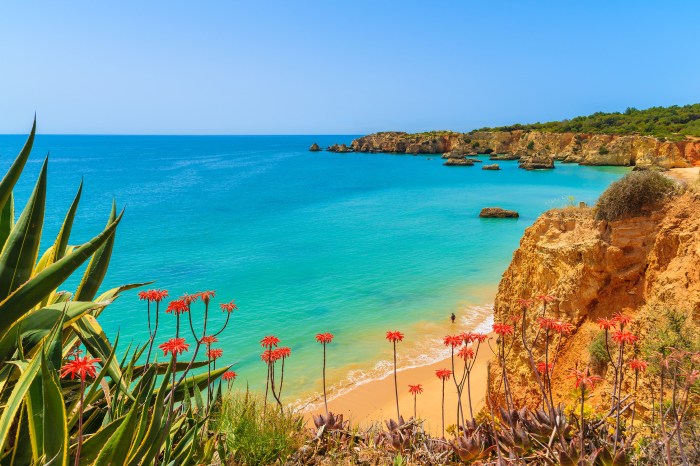
The Algarve region of Portugal offers a variety of transportation options for visitors. The region is well-connected by air, rail, and road, making it easy to get to and around.
There are several ways to get to the Algarve from other parts of Portugal and Europe. The most popular option is to fly into Faro Airport (FAO), which is located just outside the city of Faro. Faro Airport is served by a number of major airlines, including Ryanair, EasyJet, and TAP Air Portugal.
Another option for getting to the Algarve is to take a train. The Algarve is connected to the rest of Portugal by a rail line that runs along the coast. The train journey from Lisbon to Faro takes about 3 hours.
There are also several bus companies that offer service to the Algarve. The bus journey from Lisbon to Faro takes about 4 hours.
Once you are in the Algarve, there are a number of ways to get around. The most popular option is to rent a car. This gives you the flexibility to explore the region at your own pace. However, it is important to note that driving in the Algarve can be challenging, especially during the summer months when traffic is heavy.
Another option for getting around the Algarve is to use public transportation. The Algarve has a good public transportation system that includes buses and trains. However, public transportation can be slow and infrequent, especially in rural areas.
Taxis are also available in the Algarve. However, taxis can be expensive, especially if you are traveling long distances.
Flights
The Algarve is well-connected by air, with regular flights to and from major cities in Europe. Faro Airport (FAO) is the main airport in the region, located just outside the city of Faro. There are also smaller airports in Portimão and Lagos.
Advantages of flying to the Algarve:
* Fast and convenient
* Wide range of flight options
* Competitive fares
Disadvantages of flying to the Algarve:
* Can be expensive, especially during peak season
* Limited flight options to smaller towns and villages
* Airport transfers can be time-consuming and expensive
Trains
The Algarve is connected to the rest of Portugal by a rail line that runs along the coast. The train journey from Lisbon to Faro takes about 3 hours. There are also direct trains from other major cities in Portugal, such as Porto and Coimbra.
Advantages of taking the train to the Algarve:
* Comfortable and scenic journey
* Relatively inexpensive
* Convenient stations in major cities
Disadvantages of taking the train to the Algarve:
* Can be slow, especially on regional trains
* Limited train options to smaller towns and villages
* Train strikes can disrupt service
Buses
There are several bus companies that offer service to the Algarve. The bus journey from Lisbon to Faro takes about 4 hours. There are also direct buses from other major cities in Portugal, such as Porto and Coimbra.
Advantages of taking the bus to the Algarve:
* Inexpensive
* Wide range of bus options
* Convenient bus stations in major cities
Disadvantages of taking the bus to the Algarve:
* Can be slow and uncomfortable, especially on long journeys
* Limited bus options to smaller towns and villages
* Bus strikes can disrupt service
Rental Cars
Renting a car is a great way to explore the Algarve at your own pace. There are several car rental companies located at Faro Airport and in major towns and cities throughout the region.
Advantages of renting a car in the Algarve:
* Flexibility to explore the region at your own pace
* Convenient and easy to get around
* Wide range of car options to choose from
Disadvantages of renting a car in the Algarve:
* Can be expensive, especially during peak season
* Driving in the Algarve can be challenging, especially during the summer months when traffic is heavy
* Parking can be difficult in some areas
Climate
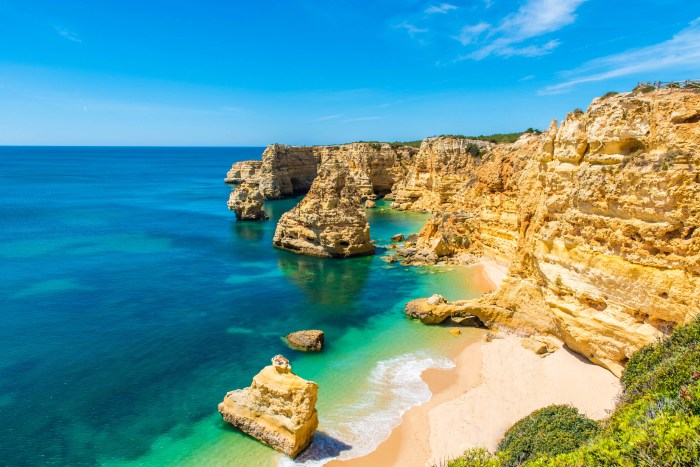
The Algarve enjoys a Mediterranean climate characterized by mild winters and warm, sunny summers. The region experiences an average of 3,000 hours of sunshine annually, making it one of the sunniest destinations in Europe.
Average temperatures range from 15°C (59°F) in January to 28°C (82°F) in August. Rainfall is generally scarce, with most precipitation occurring during the winter months. Humidity levels are moderate, typically ranging between 60% and 80%.
Best Time to Visit
The best time to visit the Algarve for beach vacations and outdoor activities is during the summer months (June to September), when temperatures are at their warmest and rainfall is minimal. However, spring (April to May) and autumn (September to October) also offer pleasant weather conditions with fewer crowds and lower accommodation prices.
Health and Safety
The Algarve region of Portugal boasts a reliable healthcare system and ample medical facilities. Public healthcare is accessible to all citizens and residents, while private healthcare options are also available. The region is well-equipped with hospitals, clinics, and pharmacies, providing comprehensive medical care to both locals and tourists.
Common Health Risks and Precautions
The Algarve generally poses minimal health risks to travelers. However, as with any destination, it’s advisable to take necessary precautions. Sunburn is common, so it’s essential to apply sunscreen regularly, especially during peak hours. Mosquito bites can also be a nuisance, so consider using insect repellent. The tap water in the Algarve is generally safe to drink, but bottled water is recommended for extended stays or sensitive stomachs.
Safety Measures and Emergency Services
The Algarve is considered a safe region with low crime rates. However, basic safety precautions should always be followed, such as avoiding isolated areas at night and being aware of personal belongings in crowded places. In case of an emergency, dial 112 for the National Emergency Number, which provides assistance in English. The Algarve also has a well-established network of fire and police stations, ensuring prompt response times.
Conclusion
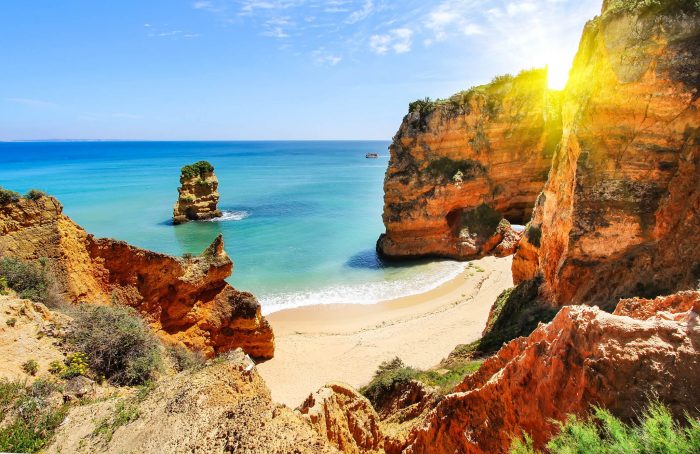
Our journey through the Algarve has revealed a region that seamlessly weaves together natural beauty and cultural heritage. From its stunning beaches and dramatic cliffs to its historic towns and vibrant cities, the Algarve offers a captivating destination that caters to every traveler’s desires.
As we bid farewell to this enchanting region, we carry with us cherished memories and a deep appreciation for its unique charm. The Algarve will forever hold a special place in our hearts, beckoning us to return and explore its hidden gems anew.
Expert Answers
What is the best time to visit the Algarve?
The Algarve enjoys a mild climate year-round, but the best time to visit is during the shoulder seasons (April-May and September-October) when the weather is pleasant and there are fewer crowds.
What are some of the must-visit attractions in the Algarve?
The Algarve is home to numerous attractions, including stunning beaches like Praia da Marinha and Praia de Benagil, historic towns like Silves and Tavira, and natural wonders like the Ria Formosa Natural Park.
What are some of the local dishes that I should try in the Algarve?
The Algarve is known for its fresh seafood, so be sure to try dishes like cataplana (a seafood stew) and grilled sardines. Other local specialties include piri-piri chicken and almond tarts.